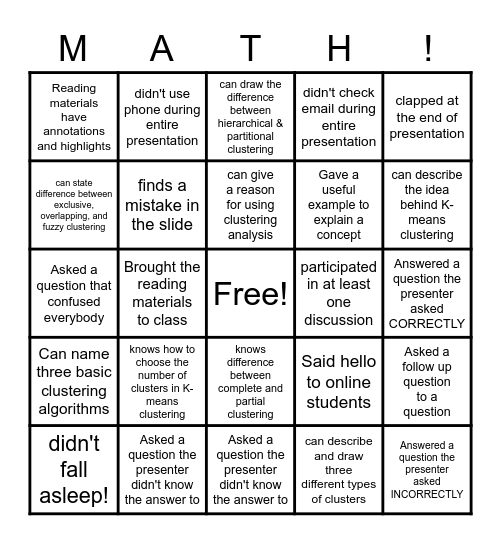

This bingo card has a free space and 24 words: knows how to choose the number of clusters in K-means clustering, Asked a question the presenter didn't know the answer to, can give a reason for using clustering analysis, didn't fall asleep!, clapped at the end of presentation, Reading materials have annotations and highlights, can state difference between exclusive, overlapping, and fuzzy clustering, didn't use phone during entire presentation, participated in at least one discussion, knows difference between complete and partial clustering, Gave a useful example to explain a concept, Asked a question that confused everybody, Said hello to online students, Asked a follow up question to a question, finds a mistake in the slide, can describe and draw three different types of clusters, Answered a question the presenter asked CORRECTLY, can draw the difference between hierarchical & partitional clustering, can describe the idea behind K-means clustering, Brought the reading materials to class, Answered a question the presenter asked INCORRECTLY, Can name three basic clustering algorithms, didn't check email during entire presentation and Asked a question the presenter didn't know the answer to.
⚠ This card has duplicate items: Asked a question the presenter didn't know the answer to (2)
Self Advocacy BINGO! | Find Someone Who.. | Landscape Construction Mentor Hardscapes | MEDICAL ASSISTING | Back to classes Bingo!
Share this URL with your players:
For more control of your online game, create a clone of this card first.
Learn how to conduct a bingo game.
With players vying for a you'll have to call about __ items before someone wins. There's a __% chance that a lucky player would win after calling __ items.
Tip: If you want your game to last longer (on average), add more unique words/images to it.